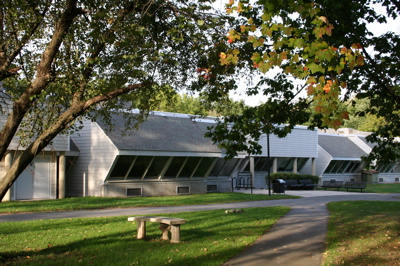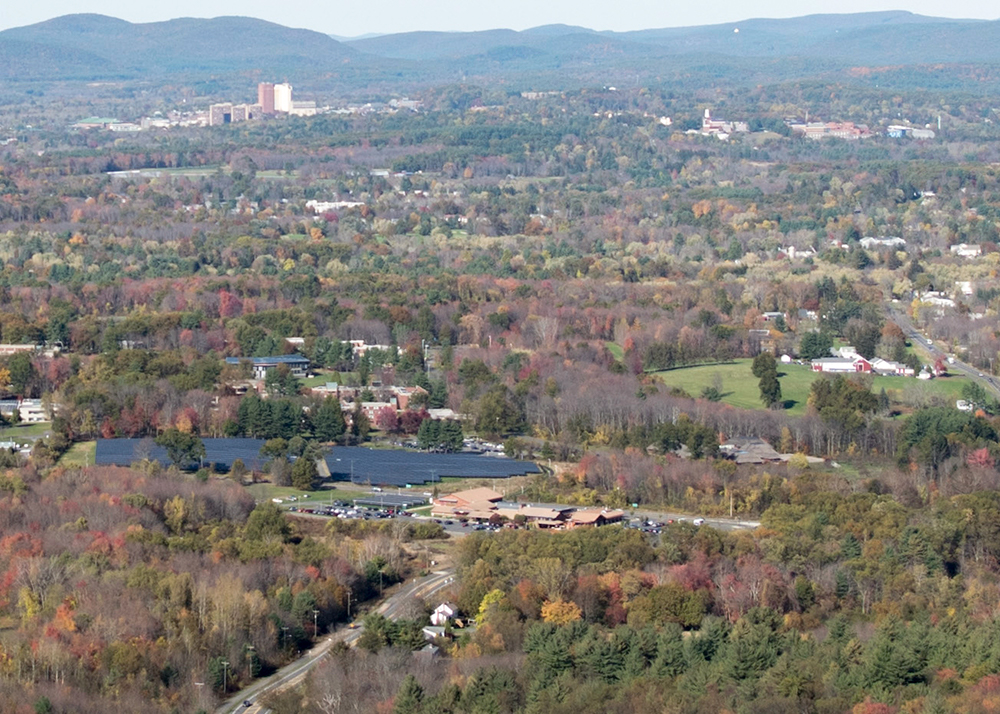
The small private college apocalypse
The dining hall and Mather building at Marlboro College, in Marlboro, Vt. It has closed and is merging with Emerson College, in Boston.
Emily Dickinson Hall, at Hampshire College, in Amherst, Mass. The nationally known college has been on the endangered list but has been been revisioning and restructuring itself. This building, designed by the architecture firm of former faculty member Norton Juster and named for the famous 19th Century poet who lived in Amherst, houses much of the college’s humanities operations.
Adapted from Robert Whitcomb’s “Digital Diary,’’ in GoLocal24.com
Many small private colleges, like much of retail, are now facing apocalyptic challenges with the huge loss of revenue caused by the pandemic. They already faced existential threats, especially the shrinking number of applicants caused by demographic changes. Many, including (especially?) in New England will close permanently in the next year or two; others may become almost entirely online operations. Our region has long been known for its large number of small private colleges, some of them very old and some created to serve the flood of Baby Boomers in the ‘60s and ‘70s.
What will become of closed campuses? I’d guess that retirement/assisted-living communities will be one major replacement. Old people comprise the most rapidly growing part of the population. And some of these colleges have lots of land now devoted to lawns and trees right around buildings and, farther away, playing fields. Some of the latter may be turned over to solar-energy facilities or even small farms, or big greenhouses. The supply-chain dangers exposed by the pandemic, as well as the desire for fresher food, and for helping local businesses, may lead many more consumers to patronize local food producers instead of national agribusiness.=
As for public-sector community colleges, they’ll increasingly be vocational-training institutions, with lots of STEM (science, technology, engineering and math) courses.
Hampshire soldiers on
Hampshire’s Latin motto, “Non Satis Scire,’’ means “To Know is Not Enough’’.
From Robert Whitcomb’s “Digital Diary,’’ in GoLocal24.com
More than a few of New England’s small private colleges are in deep trouble because of changing demographics and economics. Perhaps the most famous one is Hampshire College, in Amherst, Mass. Hampshire is well known nationally for its intimacy and for its experimental, innovative and, as they say, “student-driven’’ system. It opened in 1970 and still has a bit of its original quasi-hippie vibe from that era.
It looked as if the college would die in the academic year that ended in May but its board has managed to keep it going, under its new president, Ed Wingenbach. There was talk of merging Hampshire into a neighboring college in the Connecticut River Valley but the school, after some agonizing, decided otherwise. “That debate (over a merger) has been resolved. We will now do the hard work to have an independent Hampshire – or we will close.’’ Mr. Wigenbach came to Hampshire from the very well-respected Ripon College, in Wisconsin, where he was vice president and dean of the faculty.
Other colleges should carefully watch as Hampshire first tries to stay afloat through this academic year, and then to regain the strength it once had despite its small endowment
More troubled small colleges
Emily Dickinson Hall at Hampshire College. The building was designed by the architecture firm of former faculty member Norton Juster, and and houses much of the space devoted to humanities at the college, including creative writing and theater. It’s named after the famed 19th Century poet, who lived in Amherst.
Adapted from Robert Whitcomb’s “Digital Diary,’’ in GoLocal24.com
A couple of minor private Massachusetts colleges have announced in the past year that they’re folding -- Mount Ida and Newbury colleges. And Green Mountain College, in Vermont, announced last week that’s closing. Small colleges have been closing around America at an accelerating rate but few of them have been particularly distinguished.
However, as the demographic and financial crisis of higher education mounts, some prestigious colleges must close, too, or merge with larger, nearby institutions. Still, it was a bit of a bombshell last Tuesday to learn that Hampshire College, in Amherst, Mass., is in serious enough trouble that it’s seeking a partner, and, I assume, might have to close if it doesn’t get one.
Will a nearby institution rescue Hampshire? If so, it will probably be one of the four that helped found Hampshire in 1965 (it opened for students in 1970} for experimentation in the liberal arts when the Baby Boomer population meant surging applications. Those are the University of Massachusetts at Amherst and Smith, Amherst and Mount Holyoke colleges. Hampshire and the four comprise the Five College Consortium, whose students can take course at any of the schools.
Hampshire is known for its alternative curriculum, emphasis on portfolios rather than course-distribution requirements and reliance on professors’ narrative assessments instead of grade point averages. Despite this seemingly touchy-feely approach, the college sends a big percentage of its graduates off to highly selective graduate schools.
Since 1970, Hampshire (sometimes affectionally called “Hamster’’) has become a sort of semi-elite institution. But its $52 million endowment is far too small for its ambitions and its applications have generally been slipping in recent years as they have at many other private colleges.
Hampshire, unlike some other economically challenged colleges, has not tried to turn itself into a glorified vocational school. Rather it has stuck with an emphasis on the liberal arts – an education that produces the most engaged and effective citizens. So I hope that some way may be found for Hampshire to survive with maximum independence and not just as a sort of experimental-education campus of one or more of the other four institutions in the Five College Consortium.
Hampshire College is in foreground, the University of Massachusetts at Amherst is in the upper left while Amherst College is in upper right. They comprise, with Smith and Mount Holyoke colleges, the Five College Consortium.
— Photo by MonsieurNapoleon
Chris Powell: The U.S. created Castro's dictatorship; Hampshire College's anti-Americanism
For practical purposes Fidel Castro died a decade ago as he bequeathed his dictatorship to his brother and slipped into decrepitude. For practical purposes Cuba itself died 25 years ago upon the collapse of its financial patron, the Soviet Union. The country remains impoverished and totalitarian.
But the cheering throughout the United States, particularly from Little Havana in Miami and the right-wingers in Washington, is hypocritical. For the United States created Castro with its decades of military intervention in Cuba and then its support of his predecessor as dictator, Col. Fulgencio Batista, who overthrew Cuba's elected government in a military coup in 1952.
Indeed, there is hardly a country in the Americas that hasn't been invaded, occupied, or controlled or exploited economically by the United States in the last century and a half, even as we presume to lecture them about freedom. The Monroe Doctrine's principle of keeping European powers out of the Western Hemisphere has been one thing. It has been something else to make the hemisphere safe for the United Fruit Co. and its successors.
As in Cuba, U.S. support of oppressive regimes in the name of containing communism has led to tyrannical pushback. In Iran the shah begot the ayatollahs. In Nicaragua the Somoza regime begot the Sandinistas. In Libya King Idris begot Moammar Gadhafi.
But our intervention in Cuba has been more extreme than anywhere else. Even today the United States continues an economic embargo against the country, though President Obama has loosened it by executive action. Federal law prohibits normal relations with Cuba unless it becomes free, though there are no restrictions on our relations with similarly repressive countries like China and Saudi Arabia.
This week even President-elect Trump couldn't resist beating up on Cuba, announcing that he would reverse Obama's opening to the country unless it democratizes. (What's the problem, Mr. President-elect -- that Cuba lacks an Electoral College?)
Imperial communism is no longer a threat to the world. The only imperialism operating today is that of the U.S. dollar and the market rigging done by Western central banks to support it so this country can maintain a huge trade deficit, consuming from the world more than it produces in return.
Developing countries should be left to solve their own problems in their own way, ugly as it sometimes will seem. For foreign intervention creates distractions and resentments that tyrants exploit with nationalism and thus only makes things worse.
Permitted to have normal relations with the United States, Cubans inevitably will want more freedom, will make more demands of their government, and will be drawn into the U.S. economic sphere. Eventually the best Cuban baseball players will be able to earn a good living at home, Havana's team in the Eastern Division of the Liga Nacional will win the World Series, and, as is starting to happen in increasingly capitalistic Vietnam, people will wonder what all the fuss was about.
* * *
ACADEMIA'S OPEN DISLOYALTY: Having taken down the national colors from its flagpoles, Hampshire College, in Amherst, Mass., reflects the increasing disloyalty of academia as it sinks deeper into political correctness.
A spokesman for the college explains that for some students the American flag is "a powerful symbol of fear." But if those students were really so afraid, they wouldn't stick around. They'd high-tail it to a more congenial jurisdiction -- maybe Cuba, though, unlike the United States, that country doesn't let people leave.
Last Sunday military veterans went to the college to protest the decision about the flag. They shouldn't have bothered. Instead they should try to persuade their families to get more particular about the left-wing indoctrination that is passing for higher education.
Chris Powell is managing editor of the Journal Inquirer, in Manchester, Conn., and an essayist, mostly on political and social issues.







